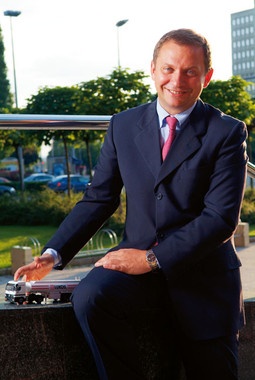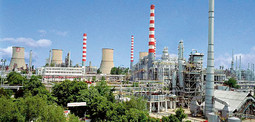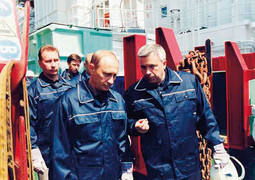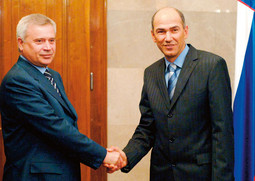Published in Nacional number 658, 2008-06-23
Oil expert for the Balkans
'Lukoil wants 100 gas stations in Croatia'
Nikolaj Ivcikov, head of Lukoil in Croatia, reveals how Russia's largest private oil company will gain control of the Croatian market, dominated by INA, Hungary's MOL and Austria's OMV
 NIKOLAJ IVCIKOV, head of Lukoil in Croatia, reveals how Russia's largest private oil company will gain control of the Croatian market, dominated by INA, Hungary's MOL and Austria's OMV A few months ago the big Russian oil company Lukoil purchased the Croatian firm Europa mil, owner of 9 petrol filling stations and an oil derivatives loading and storage facility in Vukovar. While many of those who are in the know when it comes to the situation in the oil market were surprised that Lukoil, a company that earns annual profits to the tune of over 9 billion US dollars, would enter the Croatian market by buying a small and virtually anonymous firm like Europa mil, others pointed out that it was a significant event and that the coming of Lukoil to Croatia would threaten the operations of the Croatian oil company INA.
NIKOLAJ IVCIKOV, head of Lukoil in Croatia, reveals how Russia's largest private oil company will gain control of the Croatian market, dominated by INA, Hungary's MOL and Austria's OMV A few months ago the big Russian oil company Lukoil purchased the Croatian firm Europa mil, owner of 9 petrol filling stations and an oil derivatives loading and storage facility in Vukovar. While many of those who are in the know when it comes to the situation in the oil market were surprised that Lukoil, a company that earns annual profits to the tune of over 9 billion US dollars, would enter the Croatian market by buying a small and virtually anonymous firm like Europa mil, others pointed out that it was a significant event and that the coming of Lukoil to Croatia would threaten the operations of the Croatian oil company INA.
Lukoil was seen as a predator company that would sell fuel in Croatia under cost in order to wipe out the competition and establish a monopoly. Since INA and Hungary's MOL practically do not have their own oil wells and depend on imports, a significant portion of which is in fact Lukoil's oil, there has been speculation in the press that the Russian company would in that way have a direct influence on the competition's operations. Lukoil's operations in Croatia are led by Nikolaj Ivcikov, director of Lukoil Hrvatska. Ivcikov came to the post from Bulgaria, where he led the local Lukoil subsidiary and the process of taking over the Bulgarian national oil company. Prior to that he was at the helm of the Lukoil subsidiary in Poland. He says that information that Lukoil intends to establish a monopoly on the Croatian oil derivatives market is untrue. In his words the Russian company will behave in Croatia entirely opposite to what the rumours say. It will seek to develop and liberalise the Croatian oil derivatives market, and its operations in Croatia will in no way be targeted to destroying INA.
NACIONAL: Is it not a little unusual for a large global oil company like Lukoil to enter the Croatian market by buying a small and relatively anonymous firm like Europa mil?
- I do not feel that it is unusual. There was not much choice on the Croatian market, and Europa mil was a good company, regardless of its size. It is simply a result of the trend that exists in Croatia, and that is the lack of independent firms in the oil and oil derivatives commerce sector. Croatia is an oil derivatives market currently set up to be a market for big players. Certain legal procedures make it difficult for small companies and independent entrepreneurs to get into this line of business. I do not think that is good. The Croatian market needs a strong competition and the state should encourage competition. Only in that way, through fair competition, will quality grow and prices fall. If it is the purpose of the state and the government to protect the public interest that is exactly what it should be doing.
NACIONAL: Nevertheless, Lukoil would never have purchased Europa mil had it succeeded in it intention to buy out Tifon or Energopetrol.
- That is not entirely true. Lukoil never negotiated on the purchase of Energopetrol. That was no more than media speculation. We did negotiate on the purchase of Tifon and did not manage to work out a deal in the end. I do not think that anything unusual happened in that regard, as could be read from some media reports. It is a normal part of doing business. In the end we bought Europa mil and we have plans for the significant development of that company. In the coming period we will work intensively on expanding our sales network. Our end goal is a hundred or so petrol filling stations in Croatia. I believe that is a very attainable goal.
NACIONAL: Will you limit yourself to building your distribution network or do you plan any other acquisitions in the future?
- In Croatia Lukoil will walk both routes. Besides building our own network, clearly, we will also consider the possibilities of buying some of the remaining small independent companies on the market. There are, unfortunately, very few of these. That is proof again that there are certain monopolistic trends on the Croatian market. Small firms are getting out of the business because they cannot operate profitably in these conditions and I do not think that that is good. What is more, a strong independent sector is in fact also beneficial to large multinational companies such as Lukoil. It is a corrective element on the market. As a result of its influence big firms become more efficient and cut costs. There are practically no independent companies in the oil sales sector in Croatia, even though that does almost nobody any good. The state does not collect as much tax as it could, and consumers have less choice.
 ROMANIA REFINERY: 'Lukiol's oil has been on the Croatian market for years, only now we will sell it directly to consumers', says Ivcikov
ROMANIA REFINERY: 'Lukiol's oil has been on the Croatian market for years, only now we will sell it directly to consumers', says Ivcikov NACIONAL: In what way will the arrival of Lukoil change the Croatian oil derivatives market?
- I do not think that it is only the arrival of Lukoil that is at issue. There will soon be dramatic changes in the oil market in Croatia. Croatia will soon become a member of the European Union and I believe that that will be a turning point. Under the influence of the EU Croatia will carry out the necessary reforms, reduce the bureaucratic apparatus and introduce strict European standards on the transparency of operations. Lukoil already has a great dela of experience in doing business on the markets of Western Europe and the USA and is absolutely ready for these changes. What is more, I think that in a free market our comparative advantages are even more pronounced.
NACIONAL: What are these advantages?
- Lukoil's business strategy in Croatia is only a part of our global strategy. We want to make as strong as possible a move into the oil derivatives distribution sector. The reason is very simple. Every gas station in the world earns a certain added value on the derivatives it sells in relation to the procurement price. Lukoil owns massive reserves of crude oil and refineries with enormous capacities that process that oil into derivatives. The logical question is why should we relinquish the added value that is created in the distribution to someone else. Simply put, we wish to create this superstructure and come directly to the end consumer. Lukoil's oil has been on the Croatian market for a long time, but was sold at other petrol stations. We have decided to change that and sell our product ourselves. That is the reason we purchased Europa mil.
NACIONAL: Since you intend to develop your retail network, will you cooperate with the other oil companies in Croatia?
- Of course, Lukoil is willing to consider all proposals on cooperation. I think it is important that the Croatian public understands Lukoil's strength and potential. We are interested in cooperating with regional oil companies around the world, and likewise in Croatia. If the competent people in Croatia are interested in cooperation, Lukoil is ready to take part in distribution and refinery network development programs. But we will not impose ourselves, it is not our priority. We have a business strategy in Croatia, and if we are invited to cooperate, we will give it serious consideration. On the other hand, some people are constantly trying to create misunderstandings between us and the other companies on the Croatian market. That s why we once again point out that we are ready to cooperate with all independent firms, but also with the big players such as INA, MOL or OMV. That pertains in particular to MOL, with whom we have developed cooperation and good relations in the supply of crude oil and, as far as we are concerned, there is no reason for that cooperation not to continue in the future. We respect all companies in Croatia, and information to the contrary are simply ungrounded assumptions coming from certain lobbyists and parties with vested interests.
 VLADIMIR PUTIN and Lukoil head Vagit Alekperov on one of the oil platforms in the Caspian Sea
VLADIMIR PUTIN and Lukoil head Vagit Alekperov on one of the oil platforms in the Caspian Sea NACIONAL: So that means that the accusations that Lukoil is a predator company out to destroy the competition and establish a monopoly are not true?
- Lukoil is not a predator company. We did not come to Croatia to wage war on anybody, we wish to do business normally and cooperate at all levels. I am certain that there is not a company in Croatia with more transparent operations than Lukoil. I trust that the Croatian public will also soon come to recognise this.
NACIONAL: What is the market share you wish to gain control of?
- I believe that we will gain control of between 12 and 15 percent of the Croatian market. I think that that is quite enough for a quality cash flow. The first step in the development of the Lukoil brand in Croatia will be a two-stage rebranding. The first stage will be to modify the logotypes at the existing Europa mil filling stations, while in the second phase we will reconstruct the stations in line with the Lukoil global standard. We will sell only fuels of the highest quality, which meet Euro IV and Euro V standards. All of the existing filling stations that provide Euro III quality fuels will be reconstructed as soon as possible for the sale of derivatives of higher quality.
NACIONAL: In a recent interview you criticised announcements that the second round of the privatisation of INA would be carried out by an exchange of shares with MOL. Why?
- I did not criticise anything, as I am not in a position to criticise other people's decisions. I only expressed my opinion of the information. I simply think that ahead of operations that serious, and the privatisation of the largest national company is very mush that kind of affair, a wide-reaching public debate should be held on the topic, as it affects every Croatian citizen, even those yet to be born. The point of that kind of undertaking must be to secure Croatia long-term stability in the supply of energy, as the development of the Croatian economy depends largely on that. Bearing that in mind there are certain doubts in that model. The first question is how Croatian consumers will benefit from the transaction. It is an open question whether the move would secure a reliable supply of crude oil, which would lead to lower prices and security ahead of the unpredictable fluctuations in the price of oil on the global market. The second question is how that form of privatisation will reflect on the state budget. Since there is no money involved in a share exchange combination, the state will not earn anything. The third question is how the company itself will profit from that kind of transaction. As far as that is concerned it is my opinion that INA defiantly has the potential to become an important factor not only in the region, but in Europe too. INA has refineries and oil terminals at excellent locations, a developed distribution network, and those are excellent conditions for development. Only one thing is lacking, and that is crude oil wells. An ideal synergy would be created if INA hooked up with one of the companies that have their own oil wells. That would best bring INA's potential to the fore. That is why consideration should be given to whether this model of privatisation would secure INA that kind of synergy.
NACIONAL: Rumours have appeared in the public that Government wishes through the deal to help MOL secure itself from a hostile takeover Austria's OMV is alleged to be planning. How do your interpret this?
- I have not heard these rumours so that it is difficult for me to comment them. I will say only that it is my opinion that it is not Croatia's business to worry about what will happen to a given company. Croatia should worry about improving the situation of its own companies and its citizens. In my opinion, the national energy strategy, and the privatisation of INA is likely a key element of that strategy, must be entirely transparent. If what you say is correct and if those kinds of rumours have appeared, that means that there has not been a good public debate and that the public has not been presented with firm arguments as to why the deal is to be made.
 Lukoil's top man Vagit Alekperov during a meeting with Slovenian Prime Minister Janez Jansa; Lukoil negotiated long on cooperation with Slovenian oil company Petrol, but there was no deal struck in the end
Lukoil's top man Vagit Alekperov during a meeting with Slovenian Prime Minister Janez Jansa; Lukoil negotiated long on cooperation with Slovenian oil company Petrol, but there was no deal struck in the end NACIONAL: Is Lukoil interested in building a oil unloading terminal on the Adriatic seaboard?
- From the strategic viewpoint it would be a good move, but the reality is different. The legal framework and the general investment climate in Croatia are not conducive to that kind of undertaking. I believe that the market will be liberalised with Croatia's accession to the European Union, and then the existing storage facilities and terminals will be available to all. The situation now is that the system is closed to international companies and small local firms and, as I have already said, that does not contribute to the development of competition on the market.
NACIONAL: How do you interpret the fact that there are very few Russian investments in Croatia?
- I cannot say that I have felt any kind of anti-Russian sentiment since I have been in Croatia. I do not think that Russia specifically and Russian capital are at issue here. On the other hand, numerous foreign business people have complained to me of the obstacles they encounter when trying to invest and do business in Croatia. I think that that is a general systematic problem that I do not believe has anything to do with any specific nation.
NACIONAL: Russia and Croatia have, nevertheless, negotiated on a number of joint energy projects such as DruzbAdria and the Southern Stream natural gas pipeline, none of which have come to fruition.
- It is hard for me to comment why some previous projects that were the subject of negotiation were not realised. I think that it will become evident sooner or later that Russia and Croatia are ideal partners. We have historical bonds, our nations enjoy a mutual affinity, and future relations should be built on this basis. That is why I feel that it is important to revive the dialogue between Russia and Croatia.
Lukoil's oil for the Croatian market Although Lukoil has only move to gain control of the retail market in Croatia with the acquisition of Europa mil, its oil has been sold in Croatia for years. A significant part of the fuel that is sold at Croatian petrol filling stations is imported from the Lukoil refineries in Bulgaria's Burgas and Romania's Ploestija. Both Lukoil refineries have been modernised and have a total capacity of 10 millions tonnes a year. INA's refineries in Sisak and Rijeka, on the other hand, have been waiting in line for modernisation for eight years
In Croatia after SloveniaLukoil started talks with Slovenia's Petrol back in 2006 on unifying the retail network in the Balkans. The joint company was to have over 600 petrol filling stations in the area of the former Yugoslavia. A deal was not reached in the end and that is one of the reasons why the Russians decided to open operations on the Croatian market on their own.
Related articles
'Lukoil is strongly expanding its business on the Adriatic'
Vagit Alekperov, leader of the large Russian oil company Lukoil and one of the most influential men in the world oil industry is soon to visit to… Više
Latest news
-
28.10.2010. / 14:15
'A profitable INA is in everyone's interest'
-
28.10.2010. / 09:38
Sanader’s eight fear SDP — Won’t bring down Government
-
21.10.2010. / 15:02
Interior Ministry turned a blind eye on Pukanic assassination
-
20.10.2010. / 09:34
Barisic could bankrupt HDZ




